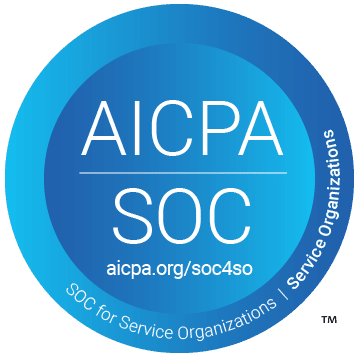Security and privacy at Supervision Assist
Security and privacy are at the core of what we do.
Our security and privacy teams establish policies and controls, monitor compliance with those controls, and prove our security and compliance to third-party auditors.
The Supervision Assist team is committed to the following principles.

Following Access Control Best Practices
- Access should be limited to only those with a legitimate business need and granted based on the principle of least privilege.
- Security controls should be implemented and layered according to the principle of defense-in-depth.
- Security controls should be applied consistently across all areas of the enterprise.
- The implementation of controls should be iterative, continuously maturing across the dimensions of improved effectiveness, increased auditability, and decreased friction.

SOC 2 Type II
Supervision Assist maintains a SOC 2 Type II attestation from an independent third party auditor.

HIPAA
Supervision Assist complies with security and privacy rules of the US Health Insurance Portability and Accountability Act.
Access to our SOC 2, HIPAA, HECVAT, and other security and privacy documentation may be accessed from our Trust Center.
Data Protection
Secret Management
Encryption keys are managed via AWS Key Management System (KMS). KMS stores key material in Hardware Security Modules (HSMs), which prevents direct access by any individuals, including employees of Amazon and Supervision Assist. The keys stored in HSMs are used for encryption and decryption via Amazon’s KMS APIs.
Application secrets are encrypted and stored securely via AWS Secrets Manager and Parameter Store, and access to these values is strictly limited.
Data At Rest
All datastores with customer data, in addition to S3 buckets, are encrypted at rest. Sensitive collections and tables also use application-level encryption.
This means the data is encrypted even before it hits the database so that neither physical access, nor logical access to the database, is enough to read the most sensitive information.
Data In Transit
Supervision Assist uses TLS 1.2 or higher everywhere data is transmitted over potentially insecure networks. We also use features such as DNSSEC and HSTS (HTTP Strict Transport Security), to maximize the security of our data in transit. Server TLS keys and certificates are managed by AWS and deployed via Application Load Balancers.
Product Security
Supervision Assist maintains an active security posture, supported with policies and practices supporting security and privacy at every stage of the Systems Development Lifecycle (SDLC).
Secure Development
Automated quality checks perform static analysis tests of code during development and in pull requests
Malicious dependency scanning to prevent the introduction of malware into our software supply chain.
Vulnerability Scanning
We maintain continuous monitoring for network vulnerabilities and intrusion detection within our AWS cloud.
External attack surface scans are made nightly to discover any new externally-facing issues.
Penetration Testing
Supervision Assist conducts penetration tests with a third party cybersecurity consulting firm at least annually. Our current pentest parter is Lost Rabbit Labs.
Enterprise Security
Security Education
Supervision Assist provides comprehensive security training to all employees upon onboarding and requires retraining annually. Training covers general information security practices in alignment with our Information Security Policy as well as specific training related to HIPAA Privacy and Security rules.
Secure Remote Access
Supervision Assist secures remote access to internal resources using an internally-controlled VPN platform.
We also use malware-blocking DNS servers to protect employees and their endpoints while browsing the internet.
Endpoint Protection
All employee devices are centrally managed and are equipped with mobile device management software and anti-malware protection. Endpoint security alerts are monitored with 24/7/365 coverage. We use MDM software to enforce secure configuration of endpoints, such as disk encryption, screen lock configuration, and software updates.
Vendor Security
Supervision Assist takes a risk-based approach to vendor security. In addition to standard measures of reliability and reputability, all vendors are evaluated for:
Security practices
Standards compliance such as SOC 2, ISO 27001, and HIPAA
Exposure surface in the case of upstream breach
View our Compliance Reports or Report a Concern
For more details of our security practices including access to our compliance reports, or if you need to report a security concern, contact us via our Trust Center.
